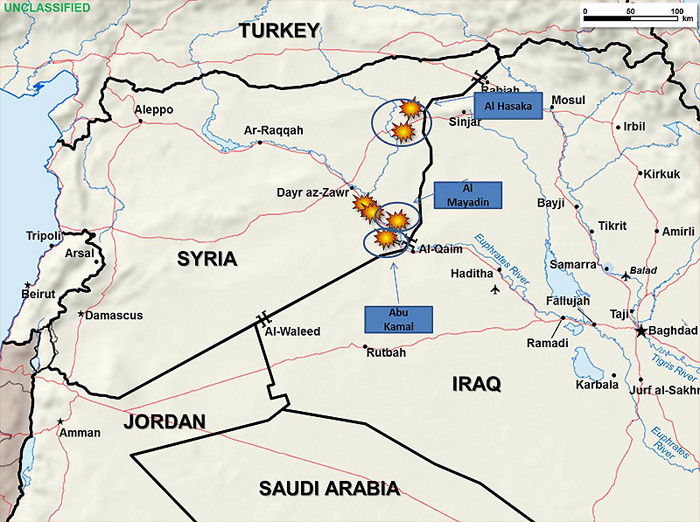What Can Russia Bring to War Against Islamic State?

(Moscow Times – themoscowtimes.com – Alexey Eremenko – October 28, 2014) Moscow will not join the U.S. effort to thwart the Islamic State terrorist group until Russian-American relations improve, Russian Foreign Minister Sergei Lavrov said this weekend.
The big question, however, is whether Russia is in fact in a position to offer any substantial aid to the anti-jihad campaign – and military analysts believe the answer is “yes.”
“Russia can do anything,” said Frants Klintsevich, a Russian lawmaker and Afghan War veteran turned military expert.
“We could solve the issue once and for all if there were only the political will to do so,” Klintsevich told The Moscow Times on Monday.
Independent experts were more reserved, but also said Russia has a lot to contribute to the fight against the Islamic State.
The list runs right up to boots on the ground: not regular troops, but private military companies that Russia is about to legalize, though possibly not in time for them to join the fray in Syria and Iraq.
Kerry’s Checklist
U.S. Secretary of State John Kerry said last week that Russia had agreed to contribute military equipment, intelligence and military training to the anti-Islamic State effort.
Lavrov then debunked these claims on Russian television, saying that Moscow would only work with the U.S. on the Islamic State within the framework of broad bilateral cooperation, which is currently suspended due to U.S. sanctions slapped on Russia over its meddling in strife-torn Ukraine.
But Kerry’s checklist is still valid on all counts, and could even be expanded, Klintsevich said.
Tracking the New Breed
The Islamic State comprises a new generation of jihadists who emerged after the veterans who cut their teeth in Afghanistan and were championed by Osama bin Laden were weeded out by nonstop conflict, said Georgy Engelgardt, a leading expert on Islamic politics in Russia.
Many of the newcomers hail from Russia’s North Caucasus or the ex-Soviet republics of Central Asia, where Russian security services retain connections and influence.
Russian intelligence could be especially useful for tracking Islamists’ affiliates outside the Middle East, as well as Islamic State veterans retiring to safer places, Engelgardt said.
Russia could also provide some insight into jihadists’ doings in Syria, whose strongman leader Bashar Assad is a longtime client of Moscow, Engelgardt said.
“But that intel is likely to be limited, given that Assad is himself an enemy of the Islamic State,” he said.
Boots on the Ground
While Russian intelligence services may have much to offer the campaign against the Islamic State, the Russian military is unlikely to follow suit.
“Russia will not fight for wars that America started,” a leading Russian foreign affairs analyst said recently at a closed gathering of experts in Harvard.
But instead, Russia could use its own private military companies (PMCs), which it is about to legalize under a bill pending review in the State Duma, another prominent Russian expert said at the same event. Both declined to be identified because the event was closed to media.
Senator Klintsevich, who co-penned the bill, said it would take Russia a few years to produce mercenary squads capable of surviving war zones.
“Getting together a PMC takes time,” Klintsevich said.
Russia’s sole excursion into private warfare failed spectacularly last year, when anti-Assad forces in Syria reported routing a squad of Russian mercenaries.
Surviving squad members told Russian media they were offered a relatively low-risk job guarding power plants and were nonplussed when faced with direct attacks by heavily armed rebels instead.
Existing Forces
Russia has the capability to staff enough PMCs with its own veterans, analysts agreed.
Western PMCs in Iraq and Syria already employ a limited number of Russian military professionals.
Russian troops also acted in an unofficial capacity during the takeover of Crimea and, allegedly, in the war in eastern Ukraine, though Moscow denies the latter. But those were regular troops rather than actual mercenaries.
Moscow also has a powerful fighting force in Chechnya under local strongman Ramzan Kadyrov, a tough-talking veteran of the Chechen war who has repeatedly slammed the Islamic State as apostates.
But Kadyrov’s own veterans of a mountain guerrilla war in Chechnya, despite their fierce reputation, may not necessarily be a match for the Islamic State’s quasi-regular army, Engelgardt said.
At least 600 Russian nationals are fighting for Islamists in Syria, Russian President Vladimir Putin said last year. That includes at least one high-ranking militant leader of Chechen origins.
Gunships, Trainers
Russia can also go on doing what it has been doing for decades in Iraq and Syria: equipping and training governmental forces of both Soviet-era allies, analysts said.
Russia continued to supply arms to Assad during the ongoing civil war in Syria, despite U.S. protests, and was rumored to be training his officers, though it was never confirmed.
Last year, the Pentagon bought 12 Russian Mi-17 helicopters for the Afghan military, with a deal for 30 more under way despite opposition in the U.S. Senate. American commanders said the Afghan army would remain grounded without the Mi-17s, which one officer said was as simple to operate “as a farm tractor.”
The Enemy of My Enemy
Finally and most importantly, the very fact of Russia throwing its weight behind the U.S. could go a long way toward curbing Islamic State’s clout in the region, where it still has many foes, even among Islamists, Engelgardt said.
He compared it to the fate of the Taliban in Afghanistan, who found themselves in global isolation and were easily smashed by the international coalition backed by Russia in 2001.
“While the big powers squabble, it’s just easier for the Islamists to operate,” Engelgardt said.
